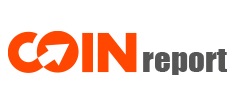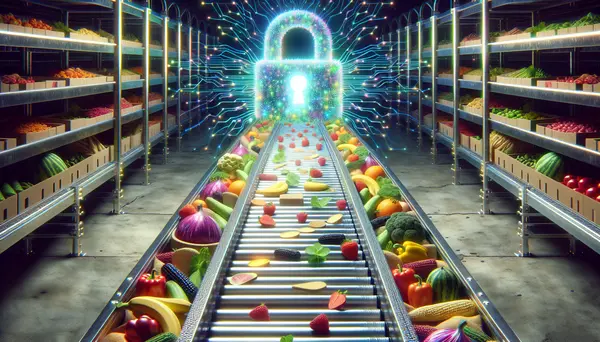Table of Contents:
Introduction: The Game Changer called Blockchain
The advent of Blockchain technology is causing a significant shift in numerous industries, not least the food supply chain. Infamous for its primary application in facilitating cryptocurrencies like Bitcoin, Blockchain has since expanded its reach far beyond the realm of finance.
In essence, a Blockchain is a secure and transparent system for recording transactions. Every transaction made is permanently recorded in a 'block', which is then 'chained' to previous transactions, creating an unalterable sequence. This technological breakthrough is now becoming an important asset in managing global food supply chains. In an industry often marred by complexities and opacity, Blockchain's remarkable features of transparency and security can provide solutions to many longstanding challenges.
The Best Mining Providers at a Glance
» Infinity HashFrom our perspective, currently the best mining provider on the market. With the community concept, you participate in a mining pool completely managed by professionals. A portion of the earnings are used for expansion and maintenance. We've never seen this solved as cleanly anywhere else.
» Hashing24A well-known and established cloud hosting company. With a good entry point and in a good market phase, a good ROI can also be generated with some patience. Unfortunately, we see the durations as a major drawback.
This article will delve into the powerful impact of Blockchain in the food supply chain, highlighting how this innovative technology can transform operations, ensure food safety, and promote sustainability. By the end of this read, even a novice in the financial or crypto realm will understand the transformative potential of Blockchain technology.
Understanding the Food Supply Chain
The food supply chain represents the journey our food takes from farm to table, a path that involves numerous stages. These stages include cultivation, processing, distribution, and retail, making it a complex network of many hands and stages. Unfortunately, this complexity often breeds inefficiencies, inaccuracies, and lack of transparency.
At every stage of the journey, information about the food product should be recorded and shared. This information can include where it was grown, how it was processed, which quality tests it passed, and how it got to your table. Sadly, this chain of information often gets broken due to fragmentation in the systems used across these stages.
Moreover, these discrepancies can lead to food safety threats, consumer mistrust, and significant losses for suppliers. This is where blockchain technology can come in to bridge gaps, provide transparency, and strengthen the food supply chain.
Advantages and disadvantages of applying Blockchain in the Food Supply Chain
| Pro | Con |
|---|---|
| Transparency: Blockchain provides a transparent and immutable ledger, reducing chances of fraud or duplicity. | Complex Implementation: It can be complex and resource-intensive to implement on an industry-wide scale. |
| Traceability: It enhances the traceability of products from the farm to the table, ensuring food safety. | Technological challenges: Not all parts of the food supply chain may have the technological infrastructure to support blockchain. |
| Efficiency: It can streamline processes, reduce paperwork and accelerate transactions. | Digital Divide: Small-scale farmers or organizations in developing countries may be left behind. |
| Consumer Trust: Blockchain can increase customers' trust in the provenance of their food. | Regulatory Considerations: It will require new regulatory frameworks and cooperation among various stakeholders. |
How is Blockchain Changing the Game?
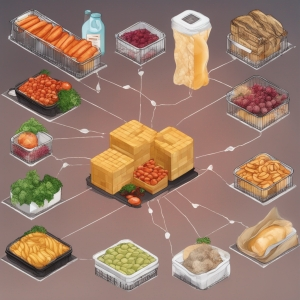
The revolution that Blockchain brings to the food supply chain is indeed remarkable. By harnessing the attributes of this technology, stakeholders in the sector can tackle several challenges that have haunted them for long.
Traceability is one of the significant aspects where Blockchain excels. With a Blockchain, every detail from the place of production, transportation conditions, to the use-by date could be recorded and validated on an immutable ledger. This feature creates a trail for each product that can be traced right back to its origin, thus assuring the authenticity and safety of food products.
Blockchain's characteristic of transparency could bridge the trust deficit that exists in the food supply chain today. As no information could be altered or obscured in a Blockchain, it guarantees a higher level of accountability. This not only reduces the chances of food fraud but may also enhance consumer confidence as they could know exactly where their food came from.
Lastly, efficiency is another area where Blockchain can contribute significantly. This decentralised system reduces the dependency on intermediate parties, hence cutting down both time and costs it takes to transport food from farms to consumers. This real-time track and trace system eliminates bottlenecks and can improve overall efficiency in the food supply chain.
In summary, the application of Blockchain to the food supply chain can bring about increased transparency, enhanced traceability, and improved efficiency. These features can significantly reduce food fraud, increase food safety, and ultimately lead to an empowered, informed consumer base.
Improving Food Safety with Blockchain
One of the most valuable capacities of Blockchain in the food supply chain is its potential for increasing food safety. The World Health Organization reports that nearly 1 in 10 people fall sick every year from eating contaminated food, indicating a dire need for better safety measures.
Blockchain's role in improving food safety lies in its ability to provide immediate, unalterable and transparent information about the journey a food product undertakes. In case of a food alert situation like an outbreak of foodborne illness or allergen contamination, having access to this level of detail ensures a rapid response. Food products which are identified as hazardous can be instantly traced back to their source, allowing for precise isolation and recall. This prevents contaminated products from reaching the consumers and minimizes the consequences of food safety incidents.
Blockchain also indirectly contributes to promoting safer farming practices. Farmers who know that their actions will be recorded and analyzed are more likely to adhere to best practices, ensuring that the food they produce meets the highest safety standards. This transparency holds them accountable and ensures that compromised methods can’t slip through the cracks.
In essence, Blockchain technology not only provides a more reactive solution for handling food safety incidents, but proactively drives a safer food supply chain, protecting suppliers, retailers and consumers alike.
Boosting Efficiency in the Food Supply Chain
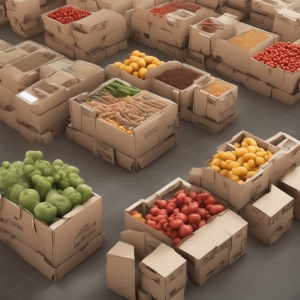
When we talk of efficiency within the food supply chain, we refer to the capability to provide products to consumers in the right quantity, quality, and time. Unfortunately, the current supply chain often falls short of these standards. The inefficiency often results in waste, delays, and cost increases, impacting everyone from farmers to consumers.
Enter Blockchain. This distributed ledger technology offers a promising solution to these inefficiencies. By leveraging its core features of transparency, traceability and security, Blockchain can re-engineer the overall efficiency of the food industry.
Blockchain makes it possible to record every single transaction and movement of food across the chain. This enormous data availability and accessibility remove the need for paper-based, human-intensive processes, thus saving considerable time and resources. Reduced need for intermediaries and instant transactions also contribute in bringing cost efficiencies.
Furthermore, the technology also paves the way for streamlining operations, thanks to its decentralized nature. Blockchain allows all parties involved in the process — farmers, food processors, transporters, and retailers — to connect in real-time and share necessary information. It promotes greater collaboration and coordination to ensure that food products move smoothly across the chain.
In a nutshell, as an innovative approach, Blockchain can streamline the processes in the food supply chain, reduce waste and delays, and enhance profitability. This efficiency not only benefits businesses in the sector but also leads to fresher and more affordable food for consumers.
A Greener Food Industry through Blockchain
As global awareness towards environmental sustainability increases, the food industry is not immune to this wave of change. The ability of Blockchain in fostering sustainable practices in the food supply chain demonstrates its truly transformative potential.
For starters, Blockchain can help promote responsible farming practices. How so? Farmers can record their farming methods onto a Blockchain, providing evidence of their environmentally-friendly practices. Consumers can then verify these practices, choosing to support foods produced sustainably.
In fact, some food producers are already using Blockchain to prove the sustainability of their products to their customers. An example of this is the fishing industry, where overfishing and illegal, unreported, and unregulated (IUU) fishing practices are rife. Here, Blockchain can register legal catches onto the ledger, creating a clear trace of legal and sustainable fishing from ocean to plate.
Furthermore, by enhancing efficiency in transportation and eliminating waste due to spoilage, Blockchain can also significantly reduce carbon emissions associated with the food supply chain. Its ability to provide real-time tracking allows for optimum delivery routes and times, subsequently saving energy.
In essence, Blockchain can foster greater accountability in the food crew, enabling consumers to make greener choices, and creating an overall more sustainable food supply network.
Looking Ahead: The Future of Blockchain in Food Supply Chain
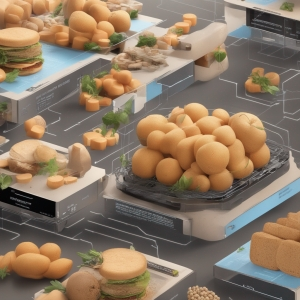
The potential of Blockchain in revolutionising the food supply chain is vast and promising. With the initial stages of its implementation yielding significant improvements, the future holds bright opportunities for further enhancements in the food industry.
As the general understanding and acceptance of Blockchain technology increase, more businesses will likely adopt this secure and efficient system. Recognising the benefits of traceability, transparency, and efficiency, companies small and large are likely to integrate Blockchain in their operations.
Moreover, consumers are becoming increasingly conscious of their consumption choices. People want to know what they eat, how it was produced, whether it aligns with their ethical values, and how it impacts their health. These factors are driving the demand for better transparency in the food supply chain, a demand that Blockchain can aptly meet.
Another notable trend is governments worldwide recognising the potential of Blockchain technology. Regulatory authorities are exploring ways to leverage Blockchain for improved oversight and regulation. In the future, we might see Blockchain-based regulations and standards becoming the norm in food supply chains.
In conclusion, Blockchain has immense potential to transform the food supply chain into an efficient, transparent, and reliable sector. As its implementation continues to grow, it promises a future where consumers can trust the food they consume, businesses enjoy increased efficiency and governments have better oversight of these crucial operations.
Conclusion: Embracing the Blockchain Revolution
As we shape the future of food supply chains, the integration of Blockchain technology is more than a perk; it's a necessity. It's a reliable tool that can help overcome the existing challenges of traceability, transparency, efficiency, and above all, food safety. With the power of Blockchain, we can ensure the authenticity of food products, build consumer trust, and promote a safer and more accountable food business landscape.
To fully harness the potential of Blockchain in the food supply chain, it's crucial for stakeholders to invest time in understanding this groundbreaking technology, its implications and application. Seamless integration of Blockchain technology also relies on regulatory acceptance, technological infrastructure, and mass adoption. This journey will be complex but the end results promise a more transparent, accountable, and prosperous food supply environment.
Blockchain's impact on the food supply chain might be still in its infancy, but it's only a matter of time before it becomes the new norm in managing global food systems. Let's remember, the future is not just about embracing technology, but leveraging it to make the world a better, safer place.
Food Supply Chain Transformation Through Blockchain
What is the role of Blockchain in the food supply chain?
Blockchain technology provides a decentralized and transparent way of recording and verifying transactions, which increases the trust and efficiency in the food supply chain.
How can Blockchain improve food safety?
Blockchain can improve food safety by providing real-time traceability from farm to fork, which can quickly identify and prevent foodborne illness outbreaks.
How does Blockchain reduce food fraud?
By providing a tamper-proof and transparent record of the food's journey, Blockchain can help prevent food fraud, such as mislabeling and adulteration.
How does Blockchain increase efficiency in the food supply chain?
It reduces paperwork, improves data accuracy, speeds up transactions, and provides real-time inventory status, which increases the overall efficiency of the food supply chain.
What challenges do we face implementing Blockchain in the food supply chain?
Some challenges include technological complexities, lack of standardization, privacy concerns, and the need for a regulatory framework. Nonetheless, the potential benefits make it worth exploring.
